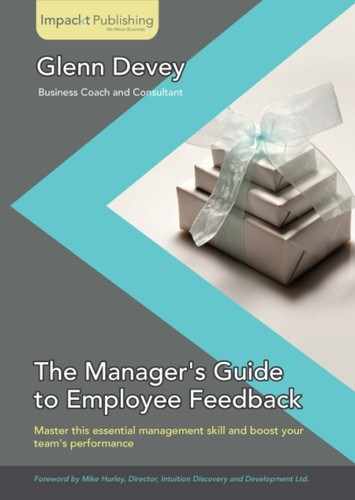"I don't go for perfect, I go for excellent. The way to become excellent is through practice." | ||
| --Robert Kiyosaki | ||
We've covered a huge amount of information in this short book. There's enough material in here to put you way ahead of your colleagues in how you deliver feedback, and when you take the ideas and implement them, your staff's performance will begin to climb steadily.
In this chapter you'll:
- Improve the delivery of your feedback
- Learn the single most important four-step plan that I've ever seen and apply it to feedback sessions
- Finish the book with an action plan to get you started on becoming the manager who gives the best feedback in your entire company!
Much of this book has focused around the use of language. I've given you structures and patterns for how to shape what you say—syntax—and I've also emphasized the use or non-use of certain words and phrases that affect how your message is received—semantics. Let's now explore another topic area that can affect the impact that your feedback has; your emotional state. By this I mean the sum total of how you are thinking, feeling, and behaving at the time that you have your conversation. Your emotional state is probably the biggest performance driver for any endeavor that you carry out, so it makes sense to ensure that it's a positive and focused one. If you've ever watched a tennis player just before match point, a football player before a penalty kick, or a boxer enter the ring, you'll notice that they are in a very focused and determined state just before the critical moment.
Athletic performance requires certain states of mind that have some similarities with the world of work. Imagine the way that your message could be affected by you feeling any of these emotions in either situation:
- Angry
- Upset
- Nervous
- Distracted
- Confused
- Anxious
- Frustrated
- Sad
- Fearful
- Irritable
So just like an athlete, before you engage in a feedback conversation, please take a moment to take stock of how you are feeling and whether you are in the optimum mental state to have a critical conversation. Whatever emotion you find yourself feeling before the conversation is likely to be related to the conversation you are about to have. Feelings, after all, are a feedback mechanism on your thoughts and actions; they let you know whether something fits with your personal values or not. If you are feeling anything less than a calm and confident state, use the following sequence to manage it:
- Identify the feeling. Are you anxious, afraid, or annoyed, for example?
- Acknowledge the feeling, remind yourself that it's okay to feel this way, and that the feeling has a purpose.
- Ask yourself exactly what the purpose is of that feeling and what you need to pay attention to in order for the feeling to change.
You can run through this sequence in your head in less than a minute, and nobody else needs to know what answers you came up with.
Tip
Anxiety, for example, is often a feedback signal that you are focusing on the wrong things. Going back to the example we used earlier in the book, a tight-rope walker would understandably be feeling anxious if they were just to focus on how badly they could be injured if they fell. Not surprising really!
If you find yourself feeling a specific way about what has happened just before you are due to have your conversation, then changing your physical posture is also an effective way of changing your emotional state and throwing off the residue from the day's events. Getting up from your seat and taking a quick walk, preferably outside the building, has a noticeable effect on how you feel. If that's not possible, just standing up, stretching, and breathing deeper than normal will change the way that you feel in the moment.
If you are demanding peak performance from your staff, don't you owe it to them to put yourself in the best possible performance state too?
Have I:
- Recalled as many facts as possible that are relevant to the issue?
- Chosen a suitable model or approach?
- Selected an appropriate time and place?
- Prepared myself mentally and emotionally?
If the answer to all of these is "yes", you need to begin!

